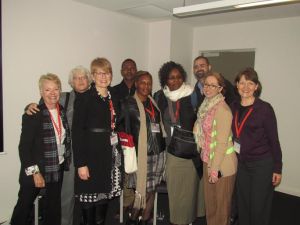Cabrini College has formed lasting relationships with the Cabrini Mission in Swaziland and is making continuous contributions that affect the residents of the kingdom.

Dr. Edna Barenbaum, associate professor of psychology, has been conducting a study in Swaziland for the past two years on the mental well-being of children. Recently, Barenbaum presented the information she has gathered at an international conference in Melbourne, Australia.
The children she has been working with are not living in an ordinary situation, however.
According to avert.org, HIV/AIDS is an epidemic that infects roughly 2.5 million people across the world per year and approximately 70 percent of that number can be found in the sub-Saharan portion of Africa. Swaziland is located in southern Africa and has been noted to being the most populated HIV area in the entire world.
Statistics show that one in four adults that reside in the land-locked country has contracted with the disease and it has taken a toll on the physical and mental health of its residents.
The physical effects of AIDS tends to get more attention than the emotional and social impact, and that is something that Barenbaum wants to make a change in.
“I have been looking at the psychosocial well-being of children in Africa whose parents or caretakers have been affected by AIDS. About 70 percent of children [in Swaziland] are parentless due to this disease and that is a very high number. Barenbaum said, “AIDS has been addressed medically and they’re solving that problem so that people can live but they’re not looking at the social and emotional impact it is having on people.”
Since 2012, Barenbaum has been making trips to the Cabrini Ministry’s mission in Swaziland on behalf of a partnership formed by former Cabrini president, Dr. Marie George. In conjunction with the mission, Cabrini College and Cabrini Australia, she along with a few other selected individuals have been conducting a study within the Cabrini organization to learn about the happiness of children affected by AIDS. Their psychological and faith-based backgrounds have guided them to the point they are at today but the data has been collected thanks to a happiness scale that Barenbaum created.
“I have a lot of experience developing standardized tests…so while I was in Swaziland I interviewed children who were living on homesteads and on the mission,” Barenbaum said. “I asked them what happiness was to them and from their answers was able to develop the scale.”
The system that she created is custom to the children of Swaziland. There have been very few studies done on the relationship between AIDS and emotional well-being and Barenbaum stated that they have been done in China, the United States and Africa. The difficulty with this is that there is not much data to go off of because the populations are so different, and so it is very difficult to compare the results.
The children that she has been analyzing are six to 21-years old and are either among the 175 children on the Cabrini mission or the 400 in a homestead setting. In addition to interviewing children to create her scale, Barenbaum also spoke to caretakers about the same topic. She was intrigued to see if their perception of a child’s happiness level was the same as the child perceived it to be or if they had noticed different behavior patterns.
“The children in the mission reported to have less depression than the children in the homesteads,” Barenbaum said.
The work that she has been doing has been considered to be ground-breaking and she presented her study and results thus far at the 20th International AIDS conference.

“I was one of 15,000 delegates at the conference and it lasted from from July 22 through July 26. I presented with the Cabrini Mission and Cabrini Australia, which was very exciting,” Barenbaum said. “I also attended the Interfaith Pre-Conference with the Missionary Sisters from Swaziland and Start Early Start Now [which focused on the early stages of childhood and how HIV can play a role in it] before the international conference began.”
Barenbaum got the chance to network with many people in her field and share information that she has been so passionate about developing. While AIDS 2014 brought her great insight of what is being done to conquer this disease, tragedy dampened the mood when Malaysian Airlines flight 17 was shot down.
Although the actual number is unknown, CNN and The Guardian reported that “a number of” the people aboard that flight were delegates for AIDS 2014 and were on their way to present at the conference.
“It was very sad but Melbourne did a fantastic job. They had a candlelight vigil for the Malaysian flight and they flew their flags at half mast,’ Barenbaum said. “They really did a lot in respect for those individuals.”
The time spent in Swaziland and Australia made an impact on Barenbaum and it has ignited her passion to helping children affected by AIDS. She is currently back in Swaziland and while there is no set completion date for her study, she is excited to once again share the information she gathered.
“We’re taking each step as we go and have evidence that progress is being made [improving the happiness levels of children],” Barenbaum said. “My focus has been impacted and we are ready to come together to solve the problems that AIDS has placed upon children.”



